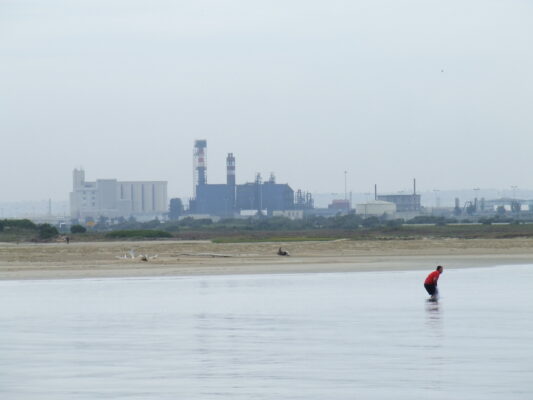CONTRIBUTING TO GLOBAL CONSULTATIONS ON CHILDREN’S RIGHT TO A HEALTHY ENVIRONMENT

The One Ocean Hub continues to contributed to the global consultations on the future content of General Comment No. 26 of the UN Committee on the Rights of the Child – which will provide international guidance on how children’s rights are impacted by the environmental crisis and what governments must do to uphold these rights.
Alana Malinde S.N. Lancaster (University of West Indies, Barbados and Deputy Director of the Global Network for Human Rights & the Environment (GNHRE) for the Caribbean region ) and Hub Director Elisa Morgera were invited to contribute to the first thematic consultation (held virtually on 16th March 2022), which focused on the implication for the Convention on the Rights of the Child of the universal recognition of the human right to a healthy environment by the Human Rights Council in 2021. Early-career researcher Mia Strand (Nelson Mandela University, South Africa), to the second consultation (held virtually on 28 March 2022) on child rights-based approach to climate action.
In addition to discussing with experts from around the world the suggestions already made by Hub researchers via global questionnaire, the Hub made further contributions during the first thematic consultation on:
- Supporting a holistic understanding of the environment, including the ocean, in building upon the definition offered by UN Special Rapporteur David Boyd “clean air, a safe climate, access to safe water and adequate sanitation, healthy and sustainably produced food, non-toxic environments in which to live, work, study and play, and healthy biodiversity and ecosystems”
- Cautioning against non-integrated approaches to environmental issues (considering the emphasis on climate change in the consultation), and rather considering the need to support awareness and capacities to address the climate-biodiversity-ocean-human rights nexus;
- Clarifying state obligations to protect children’s right to a healthy environment and a healthy ocean, by providing an integrated interpretation of due diligence obligations under international environmental law, and the minimum standards of conduct required by the UN Convention on the Rights of the Child (on which Angeliki Papantoniou, Queen Mary University of London, and Hub researchers are writing a paper on);
- Clarifying the content of children’s right to environmental education, prioritizing awareness and capacity gaps in relation to the ocean and its importance for the climate, freshwater and terrestrial ecosystems;
- Clarifying the linkages between children’s human right to play and a healthy ocean, as well as the critical links between the principle of intergenerational equity, cultural heritage and the right to culture;
- Clarifying the obligations of states as donors and trade/investment partners in relation to children’s’ rights to a healthy ocean and biodiversity;
- Clarifying business responsibility to respect children’s right to a healthy environment and healthy ocean; and
- Mapping crucial areas of participation for children and youth at different scales, and prioritize efforts to build capacity for those that are less understood, such as marine biodiversity and the threats of deep-seabed mining, as discussed at the Hub’s COP26 event with youth.
- Exploring the relevance of fair ocean research collaborations between the Global North and Global South on supporting the rights of the child to a healthy ocean as part of transformative ocean governance approaches, loss and damage in the Caribbean and Pacific SIDS, and the sustainable and inclusive governance of small-scale fisheries;
- Exploring the increasing trend of climate change litigation brought by youths in relation to the ocean-climate nexus.
During the second thematic consultation on child rights-based approach to climate action, we highlighted the following points:
- A child rights-based approach should mean a precautionary approach;
- Children must be recognised as rights holders when it comes to their participation in climate action;
- The principle of the best interest of the child in the Convention on the Rights of the Child must be adapted according to context, recognising that one size does not fit all;
- Collaboration, not consultation: Children’s empowerment and participation must ensure equitable and accessible platforms for children to get access to child-friendly information (which highlight different languages, access to technology and data etc.) and to share their own experience and knowledge as well to allow for two.way learning processes. Participation should be based on concepts of inclusion and collaboration instead of consultation and engagement, which often become superficial tick-box exercises;
- The fair treatment and meaningful involvement of all, independent of class, race, national origin, language, income, place of birth, gender, ability and age, in the development, implementation and enactment of regulations, laws and policies regarding the environment;
- Children must have access to the necessary information, which is made adequately accessible. Also ensuring children have fair and equitable access to participation platforms, which should include opportunities for non-online participation;
- Mechanisms that ensure equal opportunity for engaging should be prioritised, as well as the necessary support, contextualised approaches and empowerment to access these equal opportunities for participation, which will be particularly important for children that are continuously left out.
Hub researchers are working on in-depth papers to explore these issues as part of the ongoing partnership with the Children’s Environmental Rights Initiative, through which they will continue to provide inputs to the ensuing thematic consultations and through other opportunities to engage into the development of the UN General Comment on children’s rights and the environment.
Photo: CMR